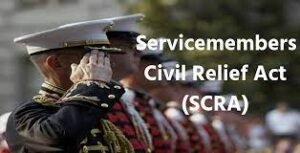 The Servicemembers’ Civil Relief Act (“SCRA”) is found at 50 U.S.C. app. §§ 501 et seq. The purpose of the SCRA is strengthen and expedite national defense by giving servicemembers certain protections in civil actions. By providing for the temporary suspension of judicial and administrative proceedings and transactions that may adversely affect servicemembers during their military service, the SCRA enables servicemembers to focus their energy on the defense of the United States. Among other things, the SCRA allows for forbearance and reduced interest on certain obligations incurred prior to military service, and it restricts default judgments against servicemembers and rental evictions of servicemembers and all their dependents. The SCRA applies to all members of the United States military on active duty, and to U.S. citizens serving in the military of United States allies in the prosecution of a war or military action. The provisions of the SCRA generally end when a servicemember is discharged from active duty or within 90 days of discharge, or when the servicemember dies. Portions of the SCRA also apply to reservists and inductees who have received orders but not yet reported to active duty or induction into the military service.
The Servicemembers’ Civil Relief Act (“SCRA”) is found at 50 U.S.C. app. §§ 501 et seq. The purpose of the SCRA is strengthen and expedite national defense by giving servicemembers certain protections in civil actions. By providing for the temporary suspension of judicial and administrative proceedings and transactions that may adversely affect servicemembers during their military service, the SCRA enables servicemembers to focus their energy on the defense of the United States. Among other things, the SCRA allows for forbearance and reduced interest on certain obligations incurred prior to military service, and it restricts default judgments against servicemembers and rental evictions of servicemembers and all their dependents. The SCRA applies to all members of the United States military on active duty, and to U.S. citizens serving in the military of United States allies in the prosecution of a war or military action. The provisions of the SCRA generally end when a servicemember is discharged from active duty or within 90 days of discharge, or when the servicemember dies. Portions of the SCRA also apply to reservists and inductees who have received orders but not yet reported to active duty or induction into the military service.
The SCRA provides in most instances that a landlord cannot evict a servicemember or dependents from a primary residence without a court order. In an eviction proceeding, the court may adjust the lease obligations to protect the interests of the parties. 50 U.S.C. app. § 531. The servicemember may ask the court to stay the proceedings. 50 U.S.C. app. § 522. The court may also order a stay on its own motion. The court will grant the servicemember’s stay application and will stay the proceeding for at least 90 days if the application includes: (1) a letter or other communication setting forth facts demonstrating that the individual’s current military duty requirements materially affect the servicemember’s ability to appear along with a date when the servicemember will be able to appear; and (2) a letter or other communication from the servicemember’s commanding officer stating that the servicemember’s current military duty prevents his or her appearance and that military leave is not authorized for the servicemember at the time of the letter. The court has discretion to grant additional stays upon further application.
When an action is stayed under the SCRA, contractual late fees and penalties do not accrue during the period of the stay. 50 U.S.C. app. § 523. If the court stays the eviction proceedings, it may provide equitable relief to the landlord by ordering garnishment of a portion of the servicemember’s pay.
Under the SCRA a servicemember may terminate residential and automotive leases if he or she is transferred after the lease is made. 50 U.S.C. app. § 535. A court may also extend some of the protections afforded a servicemember under the SCRA to persons co-liable or secondarily liable on the servicemember’s obligation. 50 U.S.C. app. § 513.
Also, with the rise in interest rates servicemembers have the right to an adjustment of an interest rate so as not to exceed 6%. In the past several years this has not been an issue, but more recently, particularly for the past few months, interest rates above six percent have been common. So, the 6% ceiling is now relevant again. If rates rise, as they are likely to do, it will become more important.
Landlords and lenders can use the Servicemembers Civil Relief Act website to obtain documentation confirming a service member’s qualifying status.
